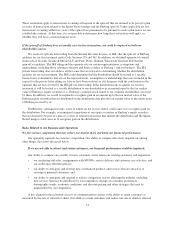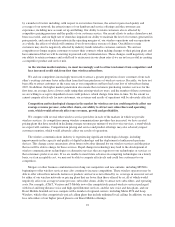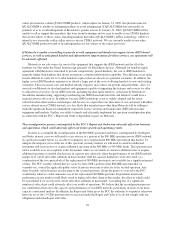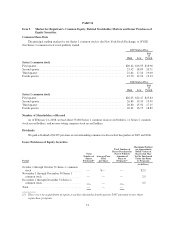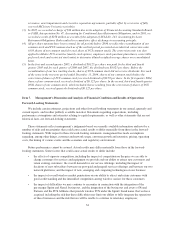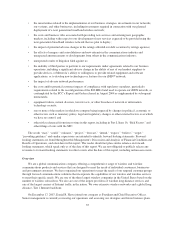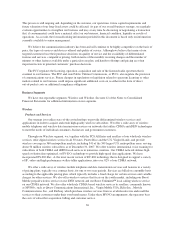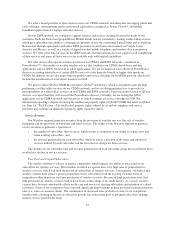Sprint - Nextel 2007 Annual Report Download - page 29
Download and view the complete annual report
Please find page 29 of the 2007 Sprint - Nextel annual report below. You can navigate through the pages in the report by either clicking on the pages listed below, or by using the keyword search tool below to find specific information within the annual report.Government regulation could adversely affect our prospects and results of operations; the FCC and state
regulatory commissions may adopt new regulations or take other actions that could adversely affect our
business prospects or results of operations.
The FCC and other federal, state and local governmental authorities have jurisdiction over our business and
could adopt regulations or take other actions that would adversely affect our business prospects or results of
operations.
The licensing, construction, operation, sale and interconnection arrangements of wireless
telecommunications systems are regulated by the FCC and, depending on the jurisdiction, state and local
regulatory agencies. In particular, the FCC imposes significant regulation on licensees of wireless spectrum with
respect to how radio spectrum is used by licensees, the nature of the services that licensees may offer and how
such services may be offered, and resolution of issues of interference between spectrum bands.
The FCC grants wireless licenses for terms of generally ten years that are subject to renewal and revocation.
There is no guarantee that our licenses will be renewed. Failure to comply with FCC requirements in a given
license area could result in revocation of the license for that license area.
Depending upon their outcome, the FCC’s proceedings regarding regulation of special access rates could
affect the rates paid by our Wireless and Wireline segments for special access services in the future. Similarly,
depending on their outcome, the FCC’s proceedings on the regulatory classification of VoIP services could affect
the intercarrier compensation rates and the level of USF contributions paid by us.
Various states are considering regulations over terms and conditions of service, including such things as
certain billing practices and consumer-related issues that may not be pre-empted by federal law. If imposed, these
regulations could make it more difficult and expensive to implement national sales and marketing programs and
could increase the costs of our wireless operations.
Our business could be negatively impacted by security threats and other disruptions.
Major equipment failures, natural disasters, including severe weather, terrorist acts, cyber attacks or other
breaches of network or information technology security that affect our wireline and wireless networks, including
transport facilities, communications switches, routers, microwave links, cell sites or other equipment or third-
party owned local and long-distance networks on which we rely, could have a material adverse effect on our
operations. These events could disrupt our operations, require significant resources, result in a loss of customers
or impair our ability to attract new customers, which in turn could have a material adverse effect on our business,
results of operations and financial condition.
Concerns about health risks associated with wireless equipment may reduce the demand for our services.
Portable communications devices have been alleged to pose health risks, including cancer, due to radio
frequency emissions from these devices. Purported class actions and other lawsuits have been filed against
numerous wireless carriers, including us, seeking not only damages but also remedies that could increase our cost
of doing business. We cannot be sure of the outcome of those cases or that our business and financial condition
will not be adversely affected by litigation of this nature or public perception about health risks. The actual or
perceived risk of mobile communications devices could adversely affect us through a reduction in subscribers,
reduced network usage per subscriber or reduced financing available to the mobile communications industry.
Further research and studies are ongoing, and we cannot be sure that additional studies will not demonstrate a
link between radio frequency emissions and health concerns.
Item 1B. Unresolved Staff Comments
On May 25, 2007, we received a comment letter from the Staff of the Division of Corporation Finance of
the SEC with respect to its review of our Form 10-K for the year ended December 31, 2006 and our Form 10-Q
27






